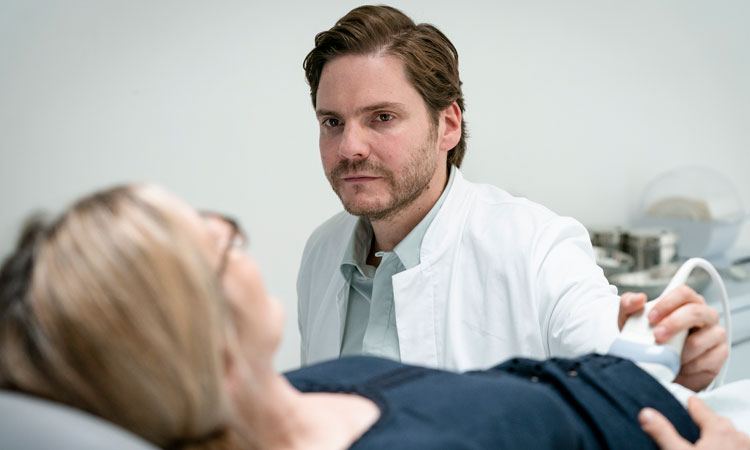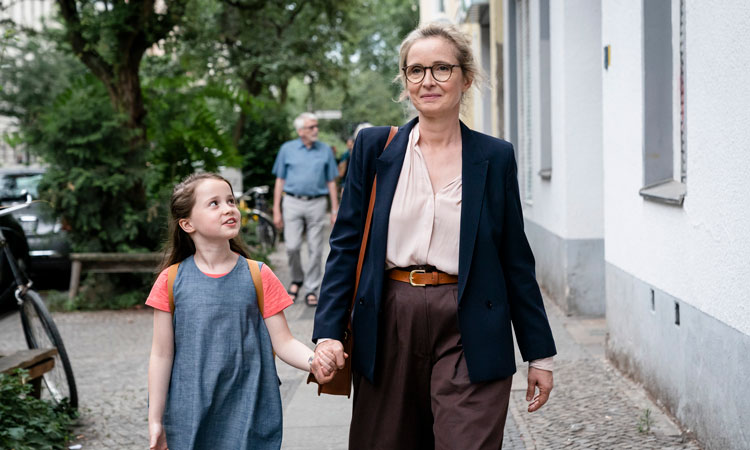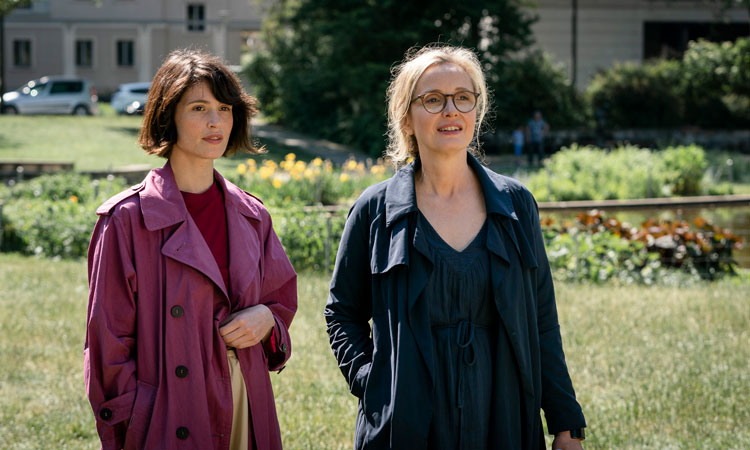Telling the story of a mother’s worse nightmare, My Zoe was directed, written and stars Julie Delpy as Isabelle – a woman who faces a morally questionable decision when she loses her beloved daughter.
Following a divorce, geneticist Isabelle is trying to rebuild her life. She has a new boyfriend and plans to revitalise her career. But ex-husband James (Richard Armitage) can’t accept this and makes her life difficult in the custody battle for their daughter Zoe. When tragedy strikes, the already broken family’s world is shattered. In reaction, Isabelle enlists the help of doctor Thomas Fischer (Daniel Brühl) and his wife Laura (Gemma Arterton) and takes fate into her own hands…
We spoke to Julie about her love of science and why this film is so personal to her…
When did you first get the idea for My Zoe?
At the time I wrote it I was in the middle of a child custody battle and it was so brutal. Since I’m a parent I understand the concept of doing anything to save your child’s life; protect him from anything and be ready for anything. If you tell me someone’s going to hurt my kid I go into this mode of almost beyond human nature, the ultimate human nature, which is saving your child. So it was in my head for a long time and then I had a kid and it became a reality. Then I had this divorce and it was a very difficult child custody battle.
There have been films about child custody battles and I always think it’s kind of cute compared to reality! For me, it was important to translate the feeling of a real child custody battle, it’s almost like the loss of a child because there is a part of that child who you will never know. For me, the obvious way to translate that was the loss of a child and then the re-creation of that child into this different child in a way. When you get shared custody, that child that you had full time disappears and now you have to re-create this relationship with this child who is sometimes very different with you than when he is with the other person.
This film is a representation of that and I love the sci-fi aspect. For me, sometimes human drama is best expressed by sci-fi. I love the kind of sci-fi where you question your own morals, I think it’s always interesting to mix human emotions and sci-fi. Even Star Wars is about family and emotions – in the end, I think all good sci-fi is rooted in some kind of complexity of human nature.
Isabelle decides to try and clone Zoe when she loses her, why did you decide to go down this route with the film?
[Isabelle] re-creates a child so basically, she gets full custody – a dream that never happens for women in America because if the mum has them full time then the dad has to pay money. I never brought the film [to be] about money because [it’s about] her need for the child; she doesn’t care about his money, she doesn’t care if he lives in a huge place and she lives in a little place and makes less money. It’s about what defines a parent.
You can question: what is cloning? It’s morally wrong as you re-create someone who existed in one form and then you basically create a twin of that person. I don’t want to be a judge of if it’s right or wrong, that’s not what the film is about. What I’m saying is that here is the journey of a woman, not some kind of big sci-fi film where everyone is getting cloned. The cloning is a personal drama, not some kind of aberration. In the film, I try to approach it from a personal point of view so you can understand her journey even if you are against it. I’m just interested in the subject and raising those questions.

Do you think people would make the same decision as Isabelle in regards to cloning their child?
[There were] a number of friends who saw it and told me that they would do it and then there were people who said ‘no it’s fate let people die’. Some people are fatalistic, some like to fight. But I think human nature in general… what we have done is go beyond what fate is, otherwise we would catch an infection from a scratch and let ourselves die because that is what nature should be about. Cloning, in a way, is one step further. It’s always a question of perspective.
How would you describe My Zoe?
It’s a sci-fi drama, I think it has an element that’s sci-fi enough to call it sci-fi but it’s [a] drama. I wrote [the film] in three acts – the first act is in our reality; everyone knows someone who has been through child custody/fighting with your ex, it’s very normal. Then the second act, which is also in reality yet in a reality that luckily not everyone has been through [of losing a child]. Then you have the third act which is one step further in a reality, which is the possibility of something that may become reality one day. Maybe it’s around the corner or maybe it’s already happening – in England there is a lot of cloning with stem cell research.
It’s everywhere, they are doing it. Trump was saved by stem cell research basically – the Regeneron experimental drug is a drug that was tested through stem cells. So it’s a reality that is a possibility. So what if you could do it? That’s when it becomes the third act with all the questions that it brings, with the doctor getting involved, it’s very medical but it’s also very human because I think they relate to each other in some way.
What were your inspirations when writing My Zoe?
I did a lot of scientific research. I read mostly history books, science books and political analysis. Science is my favourite subject. That’s the only thing that really makes me interested in reading. Human evolution is really fascinating to me because our world seems very much like before. Nothing has changed apart from computers and phones that keep on evolving but not that much in ten years really. So what’s really changing is… for example, I have an eye condition that five years ago my doctor said I will eventually go blind, but now you can actually do injections in the eye that will counteract this condition. Five years ago it wasn’t possible, and it’s not now but when I’m 80 it will stop me from going blind! I will be able to get an injection in my eye that will stop the condition. The medical research field is absolutely amazing [and] there are other things like heart conditions and brain conditions, all sorts of other things that are evolving at a speed that’s amazing.
Was this always a film that you would direct and star in?
Not necessarily. Directing for sure but not starring in it. It’s complicated because I really want to be mostly directing, so I don’t know what will happen next but I’m hoping to do a film where I’m not in it! It’s always very pleasant when I’m not acting but directing is fun and also when I’m acting and not directing. But I end up doing both because that’s how I get my film financed. I have tried to cast other actresses [but] when I write a part for a 45/50-year-old woman it’s harder to cast women my age… Maybe people are scared to play these parts!

The film doesn’t have much music in it. Why did you decide to not include much of a score?
I didn’t want music in this film. There are so many films where people are being told what to think and music is a huge factor [to that]. We have reached a level of lack of ability to not have to be told what to think. I wanted a film that doesn’t manipulate people in any way. It’s hard but I think in the third act [of the film] some people are uncomfortable and so people don’t know what to think at the end. The third act throws them off and that’s kind of the goal – they don’t even know they are just a bit angry at me and they don’t know why. It’s because I didn’t feed them what they wanted which is ‘you have to feel that way’.
I don’t like it when editors put music everywhere as it kind of masks the issues with the acting or editing – I usually work on the completely bare stuff all the way to the very end and then when I think ‘this would be nice with music there’ then I add music. But I don’t like it when music is a replacement for the lack of emotions or the lack of good writing. So for me, it’s sometimes very hard to see films that have a tremendous amount of music and it’s patching up the holes. I don’t like that because I feel tricked! Because I’m a musician, I hear the music all the time and sometimes it becomes unbearable. Some films aren’t that great but they are covered up with music. I am so obsessed with cheating with music because I hear it.
Isabelle becomes close friends with the doctor who is doing the procedure and his wife. Why did you include this additional relationship?
I think it was important that in the end, it’s the decision of another woman who is going to bring that child [into the world], not a man. He can come with all his science but in the end, it’s a human factor, it’s another woman caring for a woman that will bring this child to life. For me, it was important, because if you think of older women, or women with health issues that can’t have babies, it’s always other women that bring it to life, because of being either an egg donor or a surrogate. It’s other women’s decisions that are [helping] those women who are unable to have children to be able to have children. You have doctors around that are doing their jobs but it’s another woman that helps. To me, it was important to remind people that you can bring all the science you want [but] in the end it’s human. It’s the decision of another woman and the help of another woman that will bring this child to life.

Thomas also uses the cloning technology to help older women get pregnant. Why did you include this element?
I think it’s funny that you have a 70-year-old pregnant woman [in the film], because in reality, you can do it now! It’s not an impossible task, but at the same time, is it right? I have a father of a friend that just had a kid at 78 with a 28-year-old and I wonder if that’s better than a 60-year-old woman pregnant with the egg of another woman… I don’t know what’s better. I know it’s been going on forever and the white men rule the world so they can do what the fuck they want but in my world, I see so many women in their 50s and 60s and you go to parties and see men in their 70s with women in their 20s. It’s not so obvious that the power is in their hands and the first sign of power is really a young female. Maybe it’s the little hint of ‘what if’.
There’s such an imbalance between men and women. I think part of the reason why is there’s an under-representation of women in their 40s, 50s and 60s in films and shows is because, in a way, in people’s minds it’s like ‘now we’re done’, we have no purpose. It’s absolutely disturbing and then suddenly when you see actresses in their 70s and 80s coming back it’s because ‘oh now they’re grandmothers’ so they have a purpose again. But I think there is a blind spot throughout your 40s and 50s and I see in Hollywood how they are struggling.
It’s weird because society wants to get rid of women who are a certain age. I felt it was also important that at the end of the film [Isabelle’s ex-husband James] has rebuilt his life. He has another kid because men can do that – at 45 he loses a kid, he then gets a woman ten years younger and he has another kid and he starts his life again. For [Isabelle], it’s not possible. So losing a child, yes it’s hard for a man but for a woman in her 40s it’s everything. She’s not a mother anymore and she will never be. So if there wasn’t the help of science this would be the end of it. The film is feminist in a way in that sense – especially the fate of reproductive rights.
What’s next for you?
We went back to work about a month ago, as a group of people being tested every two days for Covid. It’s crazy. We are working with 80 people working on a set. We have the first group of people come in and do their job, then the actors and directors come in and then other people come in. You can’t mix and you can only be five or ten people in a room. It’s complete madness but we are able to work!
Signature Entertainment presents My Zoe on Digital HD out now.
